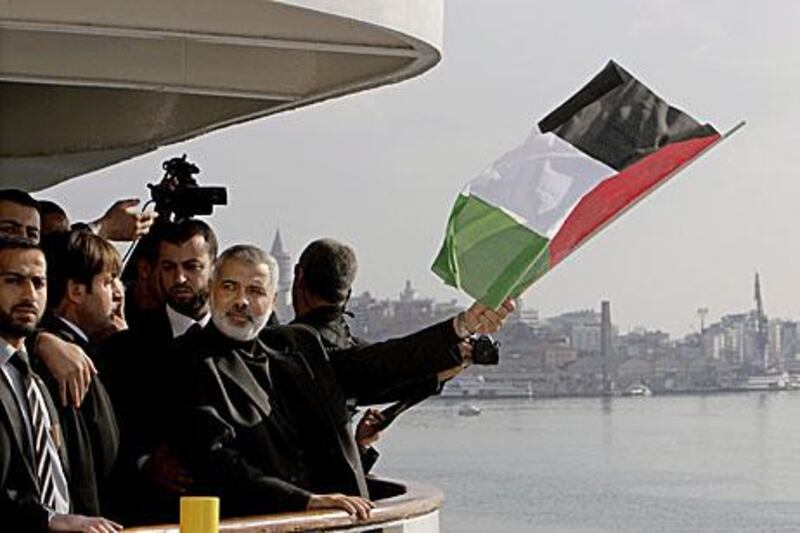ISTANBUL // Ismail Haniyeh, Gaza's Hamas prime minister, yesterday praised the Turkish government for its increasingly tough stance against Israel, its one-time ally.
Mr Haniyeh visited the Mavi Marmara, the flagship of a flotilla with aid for the Gaza Strip that was stormed by Israeli commandoes in May 2010.
Nine Turkish activists were killed in the raid, which sent Turkish-Israeli relations into a crisis from which they have not recovered.
Mr Haniyeh was making his first foreign trip since Hamas took power in Gaza in 2007 from its Palestinian rival, Fatah.
On Sunday, Recep Tayyip Erdogan, the Turkish prime minister, talked with Mr Haniyeh for two-and-a-half hours at his Istanbul home.
Veysel Ayhan, an analyst at the Center for Middle Eastern Strategic Studies (Orsam), a think tank in Ankara, said Turkey was trying to boost Hamas on the international stage.
Israel and the US have officially labelled Hamas a terrorist group.
Ankara insists the Israeli-Palestinian conflict cannot be solved if Hamas is excluded from the process. Standing in front of the Mavi Marmara, Mr Haniyeh said Palestinians were thankful for the effort to break Israel's blockade of Gaza.
"Your martyrs are our martyrs. Your blood is our blood. Your wounds are our wounds," he said, flanked by officials from the Foundation for Human Rights and Freedoms and Humanitarian Relief (IHH), an Islamic Turkish organisation that organised the Gaza flotilla of 2010.
In protest against the Mavi Marmara raid, Turkey withdrew its ambassador from Israel and expelled the Israeli envoy from Ankara.
Mr Erdogan's government has been demanding an apology from Israel and compensation payments to the families of the victims, something Israel has rejected.
The Mavi Marmara has been under repair since its return from Israel in June 2010. Last year, the IHH called off plans to send the ship on a second mission to Gaza, but Bulent Yildirim, the IHH president, said yesterday his organisation wanted the vessel to sail again.
During his visit to the shipyard where the Mavi Marmara has been docked, Mr Haniyeh was greeted by hundreds of IHH supporters, many of whom carried Palestinian flags. The ship was decorated with Turkish and Palestinian flags.
Mr Haniyeh's speech was accompanied by anti-Israeli slogans, including "Hit [them [Hamas]. Hit Israel."
"We will not bow our heads. We will not be broken," Mr Haniyeh said about Hamas's struggle against Israel.
Referring to Israel, he added: "You have prevented the Mavi Marmara from reaching the Gaza shore, but today, the people from Gaza have reached the Mavi Marmara"
Mr Haniyeh thanked Mr Erdogan's government for its pro-Palestinian position.
"In the meeting with the prime minister, I understood that there is a special place for the Palestinians in the heart of the Turkish people," he said. Mr Ayhan, the Orsam analyst, said in a telephone interview yesterday that the Turkish prime minister was trying to make a political point by hosting Mr Haniyeh.
"Hamas is a reality. If the West wants to solve the Middle East problem, it has to recognise Hamas," Mr Ayhan said. "Hamas is an important player in the Middle East."
Turkey has also been involved in efforts to get Hamas and the secular Fatah movement of the Palestinian Authority president, Mahmoud Abbas, to form a broad-based government and to end its armed struggle against Israel.
Mr Erdogan repeated his appeal for Palestinian unity during his meeting with Mr Haniyeh on Sunday, Turkish newspapers reported yesterday. Last week, Ahmet Davutoglu, the Turkish foreign minister, said that while the Palestinians had a right to resist the Israeli occupation, that resistance should be peaceful and based on unity.
Hamas and Fatah signed a reconciliation deal last May after years of bitter and often deadly rivalry, but its implementation has since stalled.
Since 2007, the Palestinian territories have been politically divided into two separate territories, with Fatah largely ruling the West Bank and Hamas governing Gaza. Mr Abbas visited Turkey last month.
Turkey is also applying pressure to persuade Hamas to cut its ties to Syria.
Mr Ayhan said Ankara supported plans to move the Hamas headquarters from the Syrian capital, Damascus, to another location in the Middle East. Turkey has been trying to isolate Syria because of the ongoing violence of the government against protesters there.
"Haniyeh is looking for a new home for Hamas," Mr Ayhan said.
While Mr Erdogan's government was encouraging the organisation to move from Damascus, it was unlikely that the future Hamas headquarters would be in Turkey.
Before his arrival in Turkey on Sunday, Mr Haniyeh visited Egypt and Sudan.
He is expected to meet leaders of Qatar, Bahrain and Tunisia on this trip. The Iranian Fars News Agency reported Mr Haniyeh would also visit Tehran in the coming days.





